Our Ukraine
- Text by Monique Jaques
- Photography by Monique Jaques

Ukraine is still healing. Following the shocking deaths of over 100 protesters in the Euromaidan uprising – a wave of protests triggered by frustrated citizens calling for European integration and an end to political corruption – Ukrainians are still processing the violence that ensued. After the bloodless Orange Revolution in 2005, many thought these protests would be similar. Now, stuck between warring neighbours – Russia pulling in one direction, Europe in the other – many of Ukraine’s youth feel torn between their Russian roots and potential European Union future.
The Euromaidan protests are credited with not only removing President Viktor Yanakovich, but uniting an apathetic disjointed youth. In a country like Ukraine where corruption ran unchecked for years, few citizens were interested in politics. But when student protests rocked the capital and kickstarted the Euromaidan movement in November, 2013, Ukrainians bore witness to the power of change.
This ongoing fight has brought together disparate groups that used to be at odds, like the right-wing Svoboda and Tatar Muslim minorities. “We’re still the same nation with the same thoughts, why shouldn’t we fight for freedom?” questions twenty-two-year-old Yevhen Revko.
Now, after the loss of Crimea and tensions in the eastern regions, many young people in Kiev fear the upcoming years will be bleak and difficult. But Ukrainians like Tihon Poitiko, eighteen, say they are fighting for their country and a better future – one that includes them and their now united voices.
Oleg Kozachenko – Actor
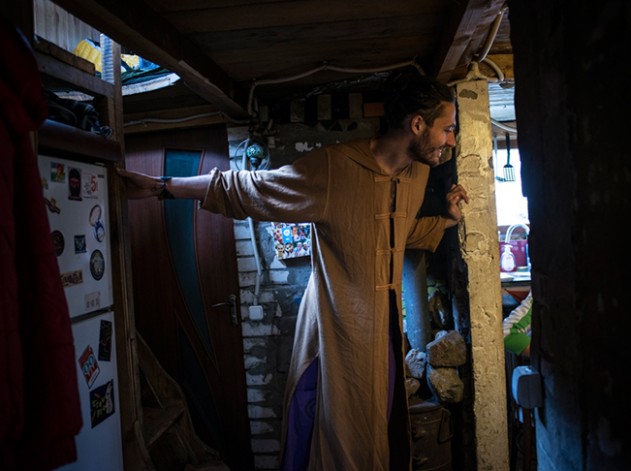
Twenty-four-year-old Oleg, an actor at the Planet Theatre, is pleased to see the Maidan – or ‘Independence Square’, where the protests too place – slowly becoming constructive rather than destructive. He worked at the Maidan, volunteering his time to serve food and tea to protesters. After the violence, he didn’t care about the EU or Yanakovich and just wanted to help those around him. Since then he’s held jam sessions in the square as a healing method. “I hope the new Ukraine will not live in fear or hate, and we will do away with borders and think independently.”
Tihon ‘Tisha’ Poitik – Pro Skateboarder
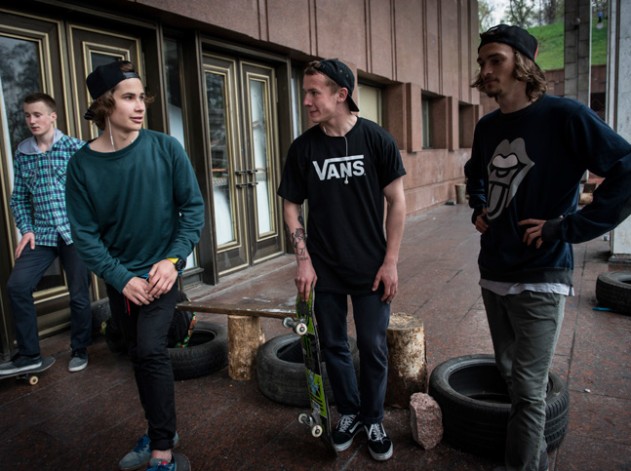
Tisha, as he is known by friends and family, is an eighteen- year-old skateboarder for Vans and Monster who is studying correspondence classes at a university in Kiev. “Our generation was raised on fear and anger, but the mentality is changing. Our country grew, mentally, after Maidan. Everyone wants change now and sees that it is possible.” He now skates at what was the Ukraine House, a former government building that was previously off limits for skaters. He hopes to leave Ukraine to skate in the EU. “Of course we love our country – we were born here. But it seems unlikely there will be a good future.”
Alona Goroshko and Denis Pasichniy – Social Scientist And Student
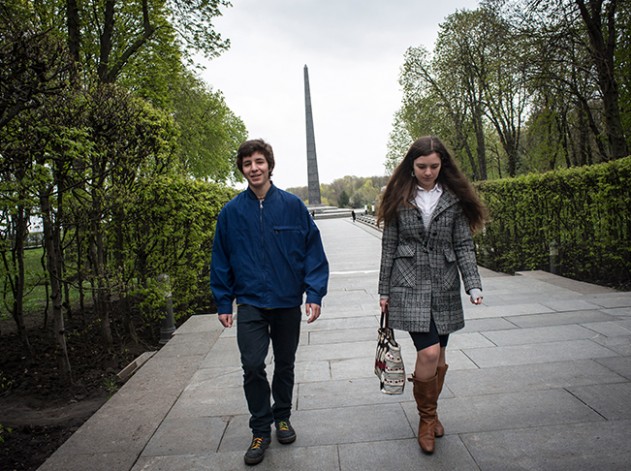
Friends Alona, twenty-six, and Denis, eighteen, came away from the Maidan protests with mixed feelings. Alona had been waiting for four years to protest a government she saw as corrupt. “It was not an open dialogue,” says the social scientist. “Now I feel exhausted, living in a place that is so tense. When Yanokovich was here I knew where to go – Maidan. Now I don’t know what to do. But I know I want to stay. Before I wanted to emigrate to the EU, but now there is a future, so I want to stay and make a life here.”
Denis was in the Maidan when protests erupted and even slept there for several weeks. One day, he ran into a burning building to try and save anyone left inside. “I wanted to go to the higher floors to see if they were clear, but it was too hot.” As the protests continued, several of his teachers urged him to leave the Maidan, eventually ushering him into a taxi to get him away from the fighting. When he got home his parents locked him in his room, but he found a way out and returned to the Maidan. “At first I went to Maidan because I have been to Europe, I saw that it was beautiful and I wanted something like that in our country. I want to have a non-visa region with Europe rather than Russia. It was purely about the EU at first, but when I was beaten by the Berkut [thugs hired by the government] and saw that no one would be charged, I realised there was corruption here.”
Yevhen Revko – Bassist In Urban Fm
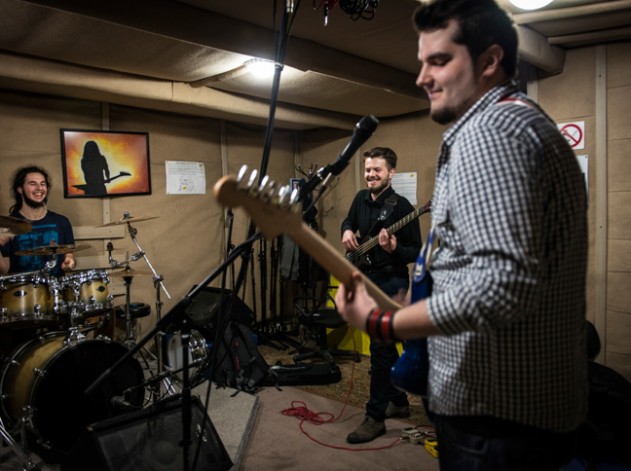
In a small practice space near the university, twenty-two- year-old Yevhen rehearses with his funk-rock group Urban FM. Their lyrics, sung in Russian, comment on social issues like corruption and the apathy felt by youth. One song, ‘Spectator’, tells the story of a person who can only stand by and look on.
“People were getting shot at, it was inhumane,” says Yehven, who sees the government as untrustworthy. “Before Maidan it was impossible to hold transparent elections, brute force was the only way to change that. But it’s so sad, civilised people in the twentieth century shouldn’t have to do that. The best thing about Maidan was the change of attitude people had towards things they don’t like. They used to think things wouldn’t change and now people are empowered, acting without leaders to make change. The Maidan mobilised the people in a necessary way. The people needed change and it brought unity.”
Dima Ryback – Skatepark Builder
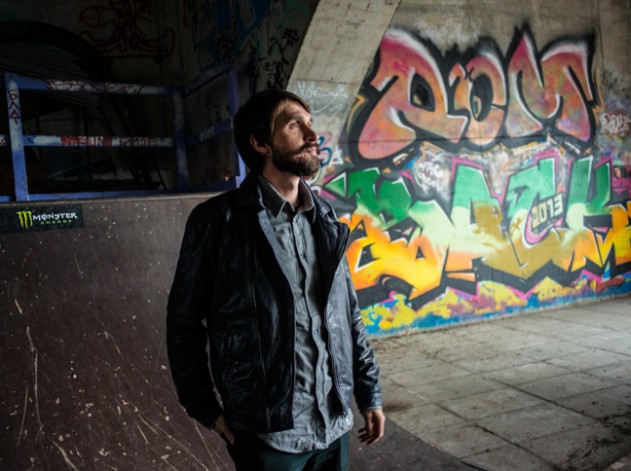
As founder of skate ramp company Kyiv Ramp Bud, Dima helped build Kiev’s best skatepark and says that the Maidan has a special place in the city’s burgeoning skate culture. “Maidan was the first place anyone skated in Kiev when it was remodelled in 1995. Now there are over 1,500 skaters in Kiev. Before the protests, Maidan was a great place to skate as it had smooth marble and many sets of stairs. But now it is finished. Maidan is too emotional.”
This article originally appeared in May 2014 in Huck 44 – The Tommy Guerrero Issue. Get it now on our web shop or subscribe to make sure you don’t miss another issue this year.
You might like

As Grindr scams in India rise, its LGBTQ+ community fights back
Red flags — Through mobilising the threat of outing queer folk, scammers are using dating apps to find targets for extortion, violence and blackmail. Mansi Rathee and Amir Bin Rafi spoke to people who have been affected, and reported on the community’s work to support victims and raise awareness.
Written by: Mansi Rathee

As amapiano goes global, where does it leave its roots?
Rainbow grooves — Over the past decade, the house music subgenre has exploded into a worldwide phenomenon. Jak Hutchcraft went to its birthplace of Mamelodi, South Africa, to explore its still-thriving local scene.
Written by: Jak Hutchcraft

See winners of the World Press Photo Contest 2025
A view from the frontlines — There are 42 winning photographers this year, selected from 59,320 entries.
Written by: Zahra Onsori

Inside Kashmir’s growing youth tattoo movement
Catharsis in ink — Despite being forbidden under Islam, a wave of tattoo shops are springing up in India-administered Kashmir. Saqib Mugloo spoke to those on both ends of the needle.
Written by: Saqib Mugloo

In Bristol, pub singers are keeping an age-old tradition alive
Ballads, backing tracks, beers — Bar closures, karaoke and jukeboxes have eroded a form of live music that was once an evening staple, but on the fringes of the southwest’s biggest city, a committed circuit remains.
Written by: Fred Dodgson

Meet the muxes of Juchitán, Mexico’s Indigenous third gender
Zapotec folk — Having existed since the pre-colonial era in southeast Oaxaca state, a global rise in LGBTQ+ hate is seeing an age-old culture face increasing scrutiny. Now, the community is organising in response, and looking for a space to call their own.
Written by: Peter Yeung

